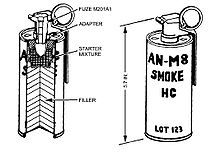AN-M8 smoke grenade

The AN-M8 HC Smoke Grenade designated as the Army/Navy Model 8 HC Smoke Grenade (AN-M8 Smoke HC) is a US military grenade used as a ground-to-ground obscuring or screening device or a ground-to-air signaling or target-marking device.[1][2]
History
[edit]Developed in the 1940s, using a sheet-steel cylinder body that can emit a dense cloud of white smoke that would last from 105 to 150 seconds.
The AN-M8 was used extensively by American or other allied forces throughout World War II to the 1990s. As of the September 2000 version of FM 3-23.30 Grenades and Pyrotechnic Signals, the AN/M8 was listed as obsolete.
Details
[edit]It is used for smoke screening, target marking, and signalling, although the M18 colored smoke grenades are mainly used for the latter.
| Army/Navy Model 8 HC Smoke Grenade (AN-M8) | |
|---|---|
| Color/Markings | light green body with black markings and a white top |
| Body | Sheet steel cylinder |
| Fuze assembly | M201A1 Pull-ring Igniter. A "mouse trap" type igniting fuze with a 1.2 to 2.0 second delay. Ignition ignites the filler and expels it from the grenade body |
| Filler | 19 ounces of Type C, hexachloroethane (HC smoke) mixture |
| Weight | 24 ounces (680 g) |
| Safety clip? | No |
| Range | Can be thrown 30 feet by an average soldier before it ignites. It can be thrown further while igniting in flight |
| Duration | The grenade emits a dense cloud of white or gray smoke that lasts for 105 to 150 seconds (1.75 to 2.5 minutes) |
Warning
[edit]- The AN-M8 hand grenade produces harmful hydrochloric fumes that irritate the eyes, throat, and lungs. It should not be used in closed-in areas unless the users are wearing protective masks.[2]
- Both the AN-M8 and the M18 risk starting a fire if used in a dry area. The steel casing, heated by the smoke-generating chemical reaction, can ignite flammable materials like trash or dry vegetation.
Field Instructional Use
[edit]When employing the M18 or AN-M8 HC hand grenade, it may be desirable to use one of these grenades without the fuze. To do this, the following procedure should be used in combat only:
- Remove the tape from grenade bottom to expose the filler.
- Remove the fuze by unscrewing it from the grenade.
- Ignite starter mixture with open flame.
- Immediately throw the grenade to avoid burn injury.
Toxicity
[edit]The HC smoke of the M8 is more toxic than that of the M18 grenade. The fumes comprise an acidic smoke of zinc chloride (ZnCl2), which produces hydrochloric acid on contact with water.[3]
Variants
[edit]M83 and Model 308-1 White Smoke
[edit]The M83 (also written AN/M83) is a modernized version of the M8, using TA (Terephthalic Acid) instead of HC as the filler mixture.[4] This is the American M83, a carrier, Smoke, striker-release, burning type, hand Grenade, used to generate white Smoke for screening activities of small units, also used for Ground-to-Air signalling, that produces a cloud of Smoke for 25 to 70 seconds.
"It also features a new body, though it uses the same fuze as the AN-M8.
Originally designed in the 1990s purely for use as a training Grenade, it has since started to replace the AN-M8 in combat."[5]
The Model 308-1 White Smoke was a modified version of the M8 produced at the Special Operations Branch of the Naval Weapons Center at China Lake California, often simply referred to as China Lake. The Model 308-1 was modified for a US Navy SEAL requirement with a greater burning rate, meaning a greater smoke output but a shorter overall burning time.[6]
See also
[edit]- M18 colored smoke grenades
- M83 White Smoke Grenade
References
[edit]- ^ "AN-M8 HC White Smoke grenade". Federation of American Scientists.
- ^ a b "Smoke Grenades". Army Study Guide. Archived from the original on 2017-12-01. Retrieved 2017-11-22.
- ^ "Appendix E: Smoke And Masking Agents" (PDF). Australian Department of Veteran Affairs. December 2003. p. E-3. Archived from the original (PDF) on 2014-02-13. Retrieved 2012-10-04.
- ^ Cooke, Gary W. Gary's Olive Drab Page, Hand Grenades Archived 22 December 2005 at the Wayback Machine. Access date:18 April 2007.
- ^ https://cat-uxo.com/explosive-hazards/grenades/m83-hand-grenade
- ^ Dockery 1997, p. 185.


 French
French Deutsch
Deutsch